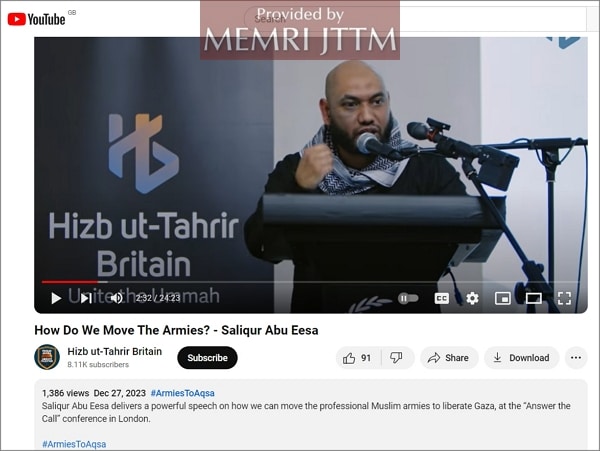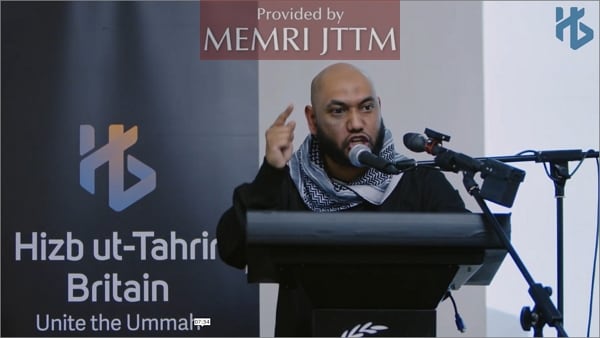The following report is now a complimentary offering from MEMRI's Jihad and Terrorism Threat Monitor (JTTM). For JTTM subscription information, click here.
On December 23, 2023, Hizb ut-Tahrir (HuT) Britain held a conference in London titled "Answer the Call: Liberate Palestine." According to a press release by HuT Britain's media office, the conference included talks on five topics.[1] "Beyond Borders: The Zionist Entity and Colonial Responsibility" described the State of Israel as the outcome of "historical colonial machinations" whose establishment has brought about "dispossession, displacement and ongoing genocide" for Palestinians. "Shared Struggle: Artificial Nation-States and Puppet Rulers" asserted that the "artificial nation-states" and "puppet rulers" of the modern Muslim world are the result of "the same colonial playbook" and that these rulers have done nothing to help Palestinians. "Rejecting Illusions: Fallacy of the Two-State Solution" ruled out the concept as an "American-backed illusion, designed to serve geopolitical interests rather than justice," and declared that enabling Jewish, Muslim, and Christian inhabitants of the area to coexist peacefully can only be achieved by reinstating the Islamic caliphate, with its "13-century track record." On the topic of "Divine Duty: Liberation as an Islamic Obligation," speakers stated that Islam requires believers "to stand against oppression, to resist occupation, and to liberate occupied lands," calling on the armies of Muslim-majority countries to "awaken from their slumber" and intervene to "protect the vulnerable and uphold justice." Discussing "Unyielding Hope: Drawing Strength from History," speakers explained that history has taught that "from Andalusia to Algeria, from India to Indonesia, Muslims have faced adversity and emerged triumphant," and predicted that "justice will prevail, and Palestine will be free."

On December 27, HuT Britain posted a 24-minute, 23-second video on its YouTube channel of a speech delivered at the conference by member Saliqur Abu Eesa.[2] Titled "How Do We Move the Armies?" the talk addresses the question of how to mobilize the professional armies of Muslim countries to "liberate Gaza."

Hizb ut-Tahrir, full name Hizb ut-Tahrir Al-Islami, or "The Party of Islamic Liberation," is a global Islamist network whose goal is to reestablish an Islamic caliphate that will rule all Muslim countries. The organization insists that it does not support using violence, but instead seeks to persuade influential Muslims to accept the necessity of restoring the caliphate before eventually "establishing government, implementing Islam generally and comprehensively, and carrying it as a message to the world."[3] On the day following Hamas' October 7 invasion of Israel, the group's emir, Ata bin Khalil Abu Al-Rashtah, published a statement celebrating the attack while insisting that Israel can only be eliminated if the battle against it is led by the restored caliphate.[4] In October, HuT Pakistan issued statements calling on Pakistani military leaders to mobilize their forces to join the jihad against Israel.[5]
Allah Calls Muslims To Liberate Palestine Through Jihad
Abu Eesa begins his talk by asserting that since the beginning of the ongoing Israel-Hamas war, the Islamic ummah [nation] "has awoken from its slumber" and "come out in its millions across the globe" to show support for Palestinians. He praises Muslims for taking various measures "to aid and support our brothers and sisters," including boycotting "Zionist goods," writing to members of parliament, giving charity, organizing protests, and creating content on social media to counteract the pro-Israel narrative. The HuT member asserts that "the voice of the ummah has echoed across the globe, from the Arab lands to Europe, from Asia to Africa, from America to Australasia," calling on the Muslim armies to "rise to the Islamic obligation of not only saving the men women and children of Gaza from this genocide, but saving all of those who are being oppressed all over the globe."

Noting the significance of Jerusalem and Palestine in Islam, he adds that it is "the land which will be the capital of the imminent khilafah, Allah willing."
Abu Eesa stresses that not only Palestinians and Muslims, but Allah himself, demands the liberation of Palestine, quoting Quran 4:75-76: "And what is it with you? You do not fight in the cause of Allah and for oppressed men, women, and children who cry out, 'Our Lord! Deliver us from this land of oppressors! Appoint for us a savior; appoint for us a helper—all by Your grace.' Believers fight for the cause of Allah, whereas unbelievers fight for the cause of the Devil. So fight against Satan's forces. Indeed, Satan's schemes are ever weak." He further quotes from the Book of Jihad in the Sahih Muslim hadith compilation to the effect that "war in Islam is waged with the view to securing liberty and freedom for those who are groaning under the oppression of the heartless tyrants."
Jihad Is The Responsibility Of Muslim Armies, Which Are Stronger Than Israel
Asking: "Whose responsibility is it to wage this jihad? […] Is this your duty sitting here in London?" Abu Eesa tells his audience: "It's not my duty. It's not your duty. It is the duty and responsibility of those who have the power and capability," meaning influential people and members of the military. The HuT member specifically lists the armies of Egypt, Turkey, Pakistan, Bangladesh, and Jordan, calling on their soldiers to alleviate the suffering of Palestinians and "bring for them and the world an atmosphere of peace and security under the banner of Islam."

Discounting the claim that Muslim armies are too weak to defeat Israel, Abu Eesa points to what Hamas has inflicted on Israel: "A group of people who have no tanks, who have no navy, who have no military budget, who have no aircrafts, have brought the Zionist entity to its knees." He alleges that Israel is targeting schools, hospitals, and churches in Gaza because "they have fear in their hearts – if this is what a handful of people from the resistance can do, imagine what the Muslim armies could do if they were united as one and served the interests of Islam."
The conference member compares the military capabilities of Muslim countries with those of Israel, explaining that the Egyptian military "is rated 14 in the whole world in the power index," compared to Israel at 18, and has a much larger population and more military aircraft, naval ships, and tanks than Israel. He adds that Turkey's military is rated 11 in the "power index" and Pakistan 7, besides being "the only one Muslim country that has nuclear weapons."
He contends that the "powers that be" want Muslims to think they are weak, but in reality, they are the ones who are weak […] It is they who are working night and day to stop […] the unification of our lands, to stop the unification of the Muslim armies for the sake of Islam." The problem with Muslims, according to Abu Eesa, is their "colonized mindset" that causes them to think they are "restricted to the nation state framework," and to "[fulfill] the interests of others rather than the interests of the ummah as a whole."
Call To End Trade With Israel, Cut Its Gas And Electricity Supply, Block Trade Routes
Discussing forms of action Muslims can take, the conference speaker suggests that countries such as Turkey cut off trade with Israel, rather than "supply the Zionist entity with military boots and clothes" and export machinery, agricultural products, automotive equipment, and chemical products to it. Abu Eesa also advises Muslim nations to cut off Israel's gas and electricity supply, and urges Egypt, Jordan, and other states to close their airspace to Israeli planes and to "[cut] off the trade routes," as Yemen's Iran-backed Ansar Allah Movement (the Houthis) has done.
Influential Muslims Must Be Persuaded To "Break The Chain Of Command," Just As Leaders Seized Power By Force
According to the HuT member, "if the armies and the people of influence move for Islam just like the Western Nations […] did for Ukraine, this ummah will be an unstoppable force."
Asserting that it is feasible to induce Muslim armies to march against Israel, Abu Eesa claims that leaders such as Mustafa Kemal Atatürk, ibn Saud, and Muammar Gaddafi all came to power by a similar formula. The first was given a "da'wah [invitation]" by Great Britain, which he accepted and then "changed the system and the leadership" of Turkey, while the second also accepted Britain's call and weapons, which he used to assume control over Arabia. The Libyan dictator similarly "wanted a change in the leadership, so he forced the move and he took the power," just as Abdel Fattah el-Sisi overthrew the democratically-elected Mohamed Morsi with the help of the military. "This is how change in the system and leadership is made," states Abu Eesa.
Muslims and Islamic movements, in Abu Eesa's view, must "create an awareness and build an opinion for change." He declares that "we need to be the ones who are giving the da'wah to those" who are influential, by showing them that they have the support of the whole ummah" and committing to pray for them if they "move for the sake of Islam." Military leaders must be reminded that "they are here to serve the ummah and not those tyrants and dictators that have sold their souls to the White House and Downing Street," and told that "it is time to rise up and answer the call to liberate Palestine."
The way to "make everlasting and clear change in the Muslim lands" is to call on those in the Muslim armies "whose hearts and iman [faith] are on fire" and convince them to "break rank from these tyrants […] and rescue the ummah under the banner of Islam." Abu Eesa praises Jordanian General Mashour Haditha al-Jazy, whose forces "defeated the Israel army in 1968" in the War of Attrition Battle of Karameh, after he "broke the chain of command and cut off communication with Amman" and then refused to implement King Hussein's order for a ceasefire. According to Abu Eesa, Al-Jazy "is an inspiration for the sincere officers in the neighboring Muslim countries to break the chain of command and save the people of Palestine."
Call To Urge Soldiers To Break Ranks, Organize Demonstrations Calling Armies To Fight Israel
Some practical steps, suggests the HuT member, are for Muslims to "make one demand and only one demand," for they "will not accept nothing but intervention of the professional armies of the Muslim countries to liberate Palestine." In order to shape public opinion in support of this goal, Abu Eesa urges his audience to "be creative" and spread the message by creating videos, memes, speeches, and articles. He also encourages them to contact their relatives serving in the militaries of Muslim countries and "ask them to break away from the regimes and mobilize under a sincere leadership to liberate," as well as to encourage their friends to extend the same call to their relatives. In addition, the HuT member calls to motivate people to take to the streets in Cairo, Istanbul, Dhaka, Islamabad, and other Muslim capitals to demand that their armies mobilize against Israel. He concludes: "Let us hear the calls on the street of Palestine, where the men, women, and children hear the calling of the takbirs [shouts of 'Allah Akbar!'] of the Muslim armies as they are coming to liberate the blessed lands."

[1] December 23, 2023.
[2] Youtube, December 27, 2023.
[3] See MEMRI JTTM Report: Profile Of Hizb Ut-Tahrir In Kenya Based On Its Online Activities, March 1, 2022.
[4] See MEMRI JTTM Report: Hizb Ut-Tahrir Leader Celebrates Hamas Offensive On Israel, Insists Jewish State Can Only Be Eliminated In A War Led By A Restored Caliphate, October 12, 2023.
[5] See MEMRI JTTM Report: Hizbut Tahrir Pakistan Calls On Pakistani Military To Fight Israel: 'Why Are [Pakistan's] Ballistic Missiles Not Being Fired At Tel Aviv To Protect Our Mujahideen?', November 20, 2023.
The full text of this post is available to subscribers.
Please login or register to request subscription information from MEMRI





